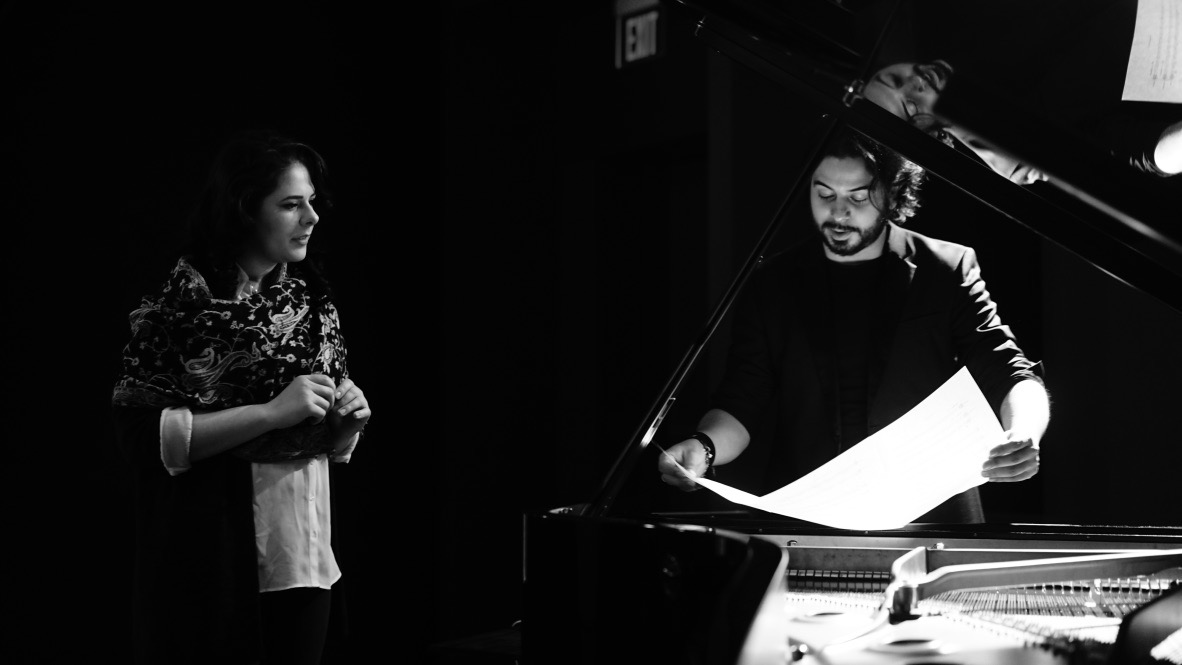Rachel Hippert and Julian De La Chica, LIVE in New York City
20 June, 8:00 PM @ The DiMenna Center in New York City, Irreverence Group Music proudly presents Soprano Rachel Hippert in the New York premier of Julián De La Chica's work: Experimentelle und unbestimmte Lieder Op. 9. This will be the first performance in the USA after its world premier in Colombia in 2017 and after the album's release also in 2017. In the second part of the concert, Ms. Hippert and Mezzo Soprano Hannah Kramer will also premier De La Chica's latest ouevre Gowanus a duet based on original poems by Susan Campos-Fonseca.
Download the PR
Download the Poster
Buy & Stream the Album
Tickets
Rachel Hippert:
Bewusstsein (Consciousness)
—
The Music
Experimentelle und unbestimmte Lieder Op. 9 (Experiential and Indeterminate Songs, op. 9) is a cycle for voice, piano, and synthesizer, inspired by reflections and experiences that I have had through the years, from which I began to consciously construct a spiritual interior life. I explore the sound of the interior voice that speaks to us in our daily intimacy, a voice that questions and challenges us. A voice that is conditioned by the world and its egos. The system.
Distanced from a religious vision, apologetic and ascetic, I work with processes that in my personal opinion have helped me in attaining self-knowledge, acceptance, and finally, plenitude. It is a method based in the Buddhist meditation Vipassana, whose process of self-purification is realized through self-observation.
I consider the search for individualism not from a moral egotist perspective but from the perspective that relates us with the collectivity that saturates and critiques. We know ourselves, re-cognize ourselves, re-discover ourselves when we decide to live freely. This brings us to a deep and raw understanding of our misery. We walk completely alone in the darkness. In the coherence of consciousness we define ourselves and evolve.
Rachel Hippert &
Julián De La Chica
Photo by Hassan Malik
Intro
Exploring the silence, a theme that composer John Cage questions and proposes in his work, is a process that I feel is necessary and vital in our existence and creative experience. In accordance with this reflection, minimalism, as a musical proposal, brings me closer to this experience. Discovering who we are, deciding to accept ourselves, and live in the plenitude of the coherence of consciousness that governs our actions and words is an ideal in the daily process of survival. The cultivation of the spirit invites us to traverse an intimate path in solitude that brings us the fullness of interior peace, a state that should not be confused with “false comfort” or a harmonious appearance that is governed by sociological protocols or canons.
The interior path, then, helps us to construct a global and objective vision of our being. It helps us in a concrete manner to endure situations and experiences, to never lose perspective, and in the final state, to experience peace, enjoyment, plenitude, including in the most vulnerable moments of our spirits, of our dark nights.
Julián De La Chica
_
Gowanus is a cycle of songs for Soprano, Mezzo Soprano, piano and synthesizer, based on 7 poems written in Spanish by Susan Campos - Fonseca.
Ser el sonido de la vida
que alguna vez palpitó en el río Gowanus.
Ser una música que existe para recordar
que lo roto alguna vez fue hermoso
y que de lo destruido,
puede brotar de nuevo la belleza,
(pero la Música también miente…)
Translation
To be the sound of life
that once throbbed in the Gowanus River.
To be a music that exists to remember
that what is broken was once beautiful
and that out of the destroyed,
beauty can sprout again,
(but Music also lies ...)"
Hannah Kramer &
Rachel Hippert
Photo by IGM
"This project comes from a very personal place for the composer, and I’ve been pleasantly surprised at how much room he’s given to me for input and collaboration. He’s also very knowledgeable about how he wants to story and share the work with our audiences – I’ve learned so much from him, and I’m so grateful towards him for his trust and guidance.”
— Rachel Hippert
Video
Soprano Rachel Hippert and Mezzo Soprano Hannah Kramer
discuss Julián De La Chica’s new ouevre:
Gowanus, poems by Susan Campos - Fonseca.
Concert Program:
—
Experimentelle und Unbestimmte Lieder Op. 9 - (J. De La Chica) (*)
Präludium
No. 1 Schweigen
No. 2 Unvollkommenheit
No. 3 Freiheit
No. 4 Bescheidenheit
No. 5 Dunkle Nacht
No. 6 Reinigung
Intermission (Approx. 20’)
No. 7 Diskurs
No. 8 Bewusstsein
No. 9 Barmherzigkeit
No. 10 Erfüllung
Epilog
Intermission (Approx. 10’)
Gowanus, Poems by Susan Campos - Fonseca - (J. De La Chica) (**)
No. 2
No. 3
No. 4
No. 5
No. 6
No. 7
No. 9
* NY Premier
** World Premier
Notes on the Program:
“Minimalism means concentration” - Anton Batagov (2016)
“Remove, remove and remove until only the essential is left.” – Eduardo Chillida
How does Julián De La Chica materialize the question of “being” in sound? Through text and music as sound material: the choice of the German tongue as a philosophic language; in its sonority, the reference to the tradition of Lieder, a form where word and sound construct a system of meanings in search of the essential. Materializing it through sound, the works achieve this “concentration” of the essential, guided by the question of the “being.”
But, how do they achieve it? Long phrases, almost Gregorian rhythmicity, recuperate the capacity for enunciation born of medieval liturgical chant and Buddhist mantras. The concentration of power in the invoked words – to enunciate is to make real what is invoked. The essence is enunciated in the concept, in the construction of the enunciations that constitute the exoskeleton of these songs. The sound materializes the concept; it is sound that creates reality. The sound is in the center of the congealed hurricane. A person that asks the question of “being”, stops time. Their presence is now; only the now exists. That instant is nonetheless a whirlwind that in the meditative act stops in front of the asking person and contemplates their mortal state, unappealable: the state of mortality as illumination.
Piano and synthesizer induce vision.The compositional technique of the author is almost sculptural, tuning in with Eduardo Chillida: “Remove, remove and remove until only the essential is left.” In this way, it achieves what Anton Batagov (2016) summarizes in a sentence: “Minimalism means concentration.”
Rachel Hippert
Photo by Hassan Malik
Rachel Hippert weaves an ontological experience with her voice. The soprano understands the underlying magma underneath the Gregorian tradition, mantra, and Lieder at the conceptual level. Her work is rigorous, contained and subtle.The dissonance between her voice and the sculptural piano and synthesizer can materialize flashes of something seen for only a moment.
The voice is a hologram of the sonic imagination, of the intellectual process of Rachel Hippert. “The quiet and still persists," Mr. Chillida wrote. In times like ours, where speed and media urgency seem to demarcate thought and creation, she stops, and with her voice, shows the density of space. Ms. Hippert seems to explore the quality that Mr. Chillida imagined in his sculptures: “I want my works to be still and quiet, the only way of escaping in part the influence of time.”
Susan Campos - Fonseca, PhD
Musicologist and composer
Rachel Hippert is charged with personifying “the wanderer” that in her dark night and her silence, confronts her fears, her lies, her truths, and her ego. Subtly, Ms. Hippert confronts the void of nothing, of the unnecessary, to become the protagonist that risks everything.
— Julián De La Chica
Behind the Scenes
the video
Don't miss the album recording's Behind the scenes and
the exclusive conversation with Soprano Rachel Hippert and watch some of the
most stunning moments of her performance.



